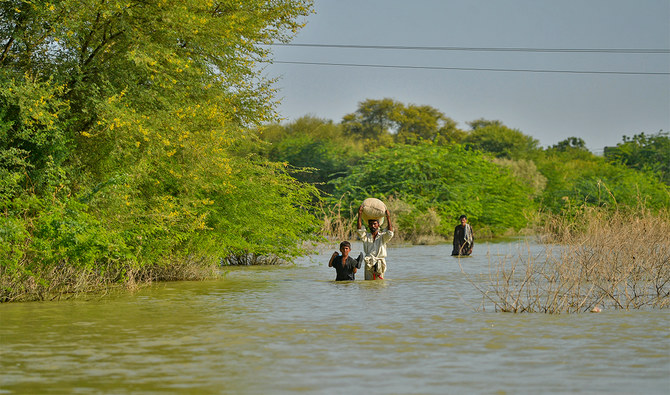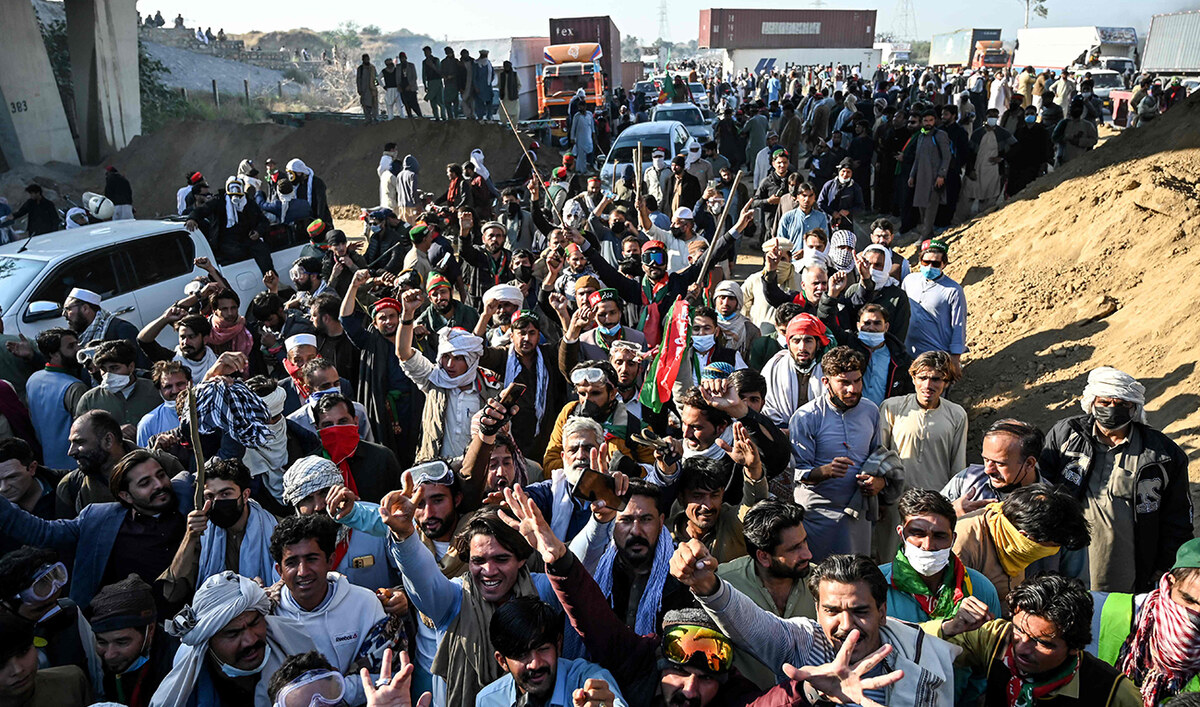DADU, Pakistan: Every part of Rajul Noor’s life has been wrecked by this summer’s massive monsoon-driven floods. The 12-year-old girl’s family home is destroyed, as is the school that she loved. The friends she used to walk to school and play with are scattered, finding refuge elsewhere.
“Our whole world is underwater, and nobody has helped us,” she said, speaking in the tent where she, her parents and four siblings now live in Dadu district in Pakistan’s Sindh province.
Almost 100 percent of the district’s cotton and rice crops were destroyed. More than half its primary and secondary schools were fully or partially damaged, local officials say. Boats laden with people and their belongings crisscross Dadu, past buildings still partially submerged, weeks after the rains stopped. This level of damage is repeated in towns and cities across Pakistan.
The destruction has intensified the debate over a question of climate justice: Whether rich countries whose emissions have been the main driver of climate change owe compensation for the damage that change is inflicting on poor countries like Pakistan.
It’s an idea that developed nations have repeatedly rejected, but Pakistan and other developing countries are pushing for it to be seriously discussed at COP27, next month’s international climate conference in Egypt.
Pakistan in many ways crystalizes the debate. Scientists have said climate change no doubt helped swell monsoon rains this summer that dumped three and a half times the normal amount of rain, putting a third of the country underwater. At least 1,700 people were killed, and 33 million people in Pakistan have been affected.
Pakistan, which contributed only 0.8 percent to the world’s emissions, now faces damages estimated at more than $30 billion, more than 10 percent of its GDP. It must repair or replace two million damaged or destroyed homes, nearly 24,000 schools, nearly 1,500 health facilities and 13,000 kilometers of roads. Bridges, hotels, dams, and other structures were swept away.
“These 33 million Pakistanis are paying in the form of their lives and livelihoods for the industrialization of bigger countries,” Pakistani Foreign Minister Bilawal Bhutto-Zardari said on the sidelines of the UN General Assembly last month.
Climate Change Minister Sherry Rehman went further, saying rich nations owe reparations to countries hit by climate disasters.
Developed nations have refused anything that smacks of reparations, fearing the door will open to massive climate claims against them from around the world.
They agreed to give money to help poorer countries reduce emissions and adapt their infrastructure for future climate change, though they have been slow in providing the money. But at COP26 in Glasgow last year, the United States and European Union members rejected demands for a fund to compensate poor countries for “loss and damage” -- destruction already wrought by climate change.
“Bigger states are extremely concerned about liability. How long can they keep kicking the can down the road? They may at some point want to settle as the issue isn’t going to go away,” said Margeretha Wewerinke-Singh, assistant professor of international public law at Leiden University in the Netherlands.
She is lead counsel for the tiny Pacific island nation of Vanuatu in its pursuit of an advisory opinion on climate change from the International Court of Justice.
Wewerinke-Singh said there is a basis for legal action. International law says states have an obligation not to cause harm to the environment of other states. Violations can trigger an obligation to make reparation — either restoring the situation to what it was before or providing compensation.
Pakistan has two options, she said. It could go after states through an international body like the ICJ. But this avenue rules out China and the US, two of the world’s biggest greenhouse gas emitters, as they don’t recognize the ICJ’s jurisdiction. Or it could pursue cases against governments or fossil fuel companies in national courts.
She pointed to successful suits against tobacco companies for the harm caused by smoking.
“Climate change litigation is in its infancy. Tobacco litigation is an example of litigation that was construed to be far-fetched, but it really took off,” she said.
Regardless of Rehman’s statement, Pakistan’s prime minister and foreign minister have both said their country is not demanding reparations. Instead, they have spoken forcefully of rich countries’ moral obligation to help Pakistan as a victim of climate change.
That may reflect a calculation on Islamabad’s part that it is more likely to get the funding it needs by pressing developed countries to give at a UN-backed donor conference for Pakistan expected later this year, rather than stoke their fears on reparations by pursuing a long-term, systematic solution like a fund for loss and damage.
Complicating the case for reparations is the question of how much Pakistan’s own policies worsened the impact of the flood disaster.
Ayesha Siddiqi, an expert on climate change and disasters, said the greater responsibility for the destruction lies with those causing climate change, “but there is responsibility” with Pakistan as well. She was one of the authors on a scientific paper released last month that pointed to Pakistan’s self-created vulnerabilities.
Pakistan approved a national flood protection plan in 2017 but never put it in place. The World Bank extended a $200 million credit line to fund flood protection projects in Balochistan province but it was suspended because of Pakistan’s lack of progress in implementing it; the projects were supposed to have been completed this month.
The biggest problems that Siddiqi and others point to are unrestricted building in flood zones and Pakistan’s reliance on engineering mega-projects like large dams and drainage systems along the Indus River Valley. Those mega-projects only worsen destruction by trying to pen up floodwaters, they say, when it should be trying to let the inundation flow through with as little harm as possible.
“It’s about controlling the river, taming the river, rather than small-scale solutions to manage the water and working with the ecological system,” Siddiqi said.
No reforms were enacted after 2010 flooding that killed nearly 2,000 people, said Daanish Mustafa, who co-authored Pakistan’s first climate change response strategy and was lead author on a UN flood response strategy for Pakistan.
He has recommended removing obstacles that block natural drainage and preventing home building on flood plains.
In Dadu, Noor keeps the same routine as she once did in her village of Gholam Nabi Pir. She wakes at 5 a.m. and helps her four younger siblings get ready for the day. They go to school in a nearby tent. But there’s no longer the long walk to school with her friends, no more playing tag around her house, no hearty traditional breakfast of fried eggs and paratha flatbread.
“I lived happily at home. I miss everything about it,” she said. “It makes me cry.”























